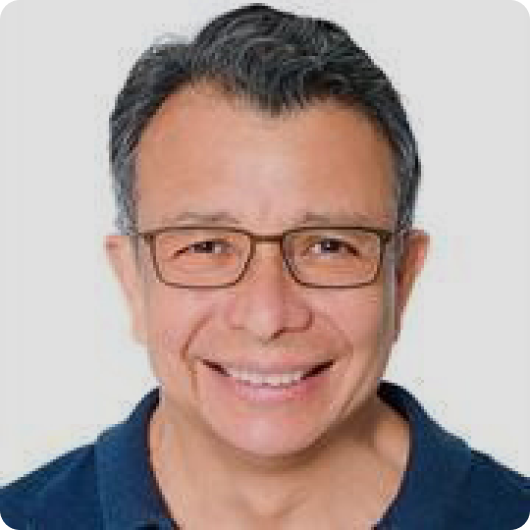A/Prof Alfredo Franco-Obregón
Associate Professor
Research Interest
My principal scientific focus is to understand how fundamental biophysical forces, such as mechanical, electrical, and electromagnetic stimuli, translate into organismal regeneration and survival. I am particularly interested in those biophysical processes that govern skeletal muscle development. Of all the tissues of the body, skeletal muscle is the most responsive of to both mechanical and electromagnetic forces. Moreover, as our largest tissue mass skeletal muscle has evolved to play a predominant role in establishing whole-body maintenance and general health. Exercised (mechanically stimulated) skeletal muscle improves glucose utilization, stimulates fatty acid oxidation, improves insulin sensitivity and metabolic efficiency, promotes cardiovascular health as well as postpones mental and physical senescence. We have recently shown in several published studies that “magnetotransduction” and “mechanotransduction” recruit common enzymatic and transcriptional cascades involved in metabolic stabilisation.
Therefore, a subset of the metabolic adaptations typically associated with exercise can be similarly set into motion by appropriately designed electromagnetic stimulation paradigms, but in response to much briefer intervention and without the physical exertion associated with exercise. Magnetic field therapy may hence be employed as a non-invasive exercise mimetic in the clinically immobilised, frail, or elderly populations. Specifically, I am investigating how mechanical and magnetic stimuli stimulate Transient Receptor Potential (TRP) channel-mediated calcium entry for the ultimate purpose of exploiting this process to promote muscle development. We were the first to describe the existence of mechanosensitive (PMID: 1691450; PMID: 2170636) and magnetoresponsive (PMID: 31518158) TRP channel classes in skeletal muscle.
I have since dedicated much of my scientific career to delineating the role of certain TRP channels in skeletal muscle development as well as in devising methods and technologies capable of exploiting these two forms of biophysical stimuli to non-invasively and non-pharmacologically postpone age- and disease-related muscle loss as well as enhance metabolic efficiency in states of inherent or imposed immobility in collaboration with clinicians , technologists and government agencies here at the NUS/NUH. In brief, with the understanding of how to best modulate this mechanosensitive/magnetosensitive (TRP channel) calcium pathway we are now in a better position to positively influence many aspects of human health and longevity. Our magnetic technologies are currently on path for eventual clinical translation.
My approach to tissue engineering and regenerative medicine is unique in that I focus on the fundamental transduction apparatus normally activated by mechanical or magnetic forces to promote tissue development, in lieu of more conventional pharmacological approaches, a conscious choice. Drugs, although highly specific, activate, at most, only a subset of the downstream enzymatic cascades normally evoked by mechanical or magnetic stimuli and therefore lead to imbalanced developmental responses. Finally, given that we modulate tissue development at the level of fundamental cellular transduction (TRP channels responses) we have been able to conquer certain problematic in vitro and in vivo development programs as well as have exposed numerous counterproductive practices common to conventional tissue-engineering strategies.
Finally, I am also a founder of QuantumTx Pte. Ltd., a NUS spin-off company, whose aim is to design and fabricate for commercialisation magnetic therapeutic devices for human rehabilitation and regenerative therapies. QuantumTx was awarded the Innovation of the Year Product Winner by the Ageing Asia World Ageing Festival in 2020.
Teaching Interests
Teaching Philosophy I have engaged extensively in the teaching/training of young scientists. My teaching philosophy is to bring students to a point of realization. I do so by emphasising first principals, rather than rote memorisation. This approach ultimately renders the students greater autonomy and resourcefulness (self-learning). At the ETH Zurich, Switzerland, I was in charge of teaching cell biology and biological research methodology to Engineering, Computer Science and Physics graduate students. I thought these courses from a thermodynamic perspective, challenging the students to ask themselves fundamental questions: 'From what you understand, does it make sense that this reaction/process should go forward? If not, what is missing from your knowledge?' Teaching Focus My teaching forte is cellular physiology, mechanobiology and tissue engineering strategies. I could also teach courses in cellular pathophysiology and ion channel physiology, or any combination thereof. I would also be able to organize a course in exercise or muscle physiology and it relationship to overall human health.
Teaching/Mentoring Awards
- University California at San Francisco (UCSF) 1990: Martin Luther King Mentorship Award
- Swiss Federal Institute of Technology (ETH) 2008: Goldenen Eule (The Golden Owl Excellence in Teaching Award)
- National University of Singapore (NUS) 2015: Wong Hock Boon Society Best Mentor Award
- ETH Teaching Evaluations Institutional teaching evaluations from the ETH, Zurich, for the years 2005-2011 are available upon request. Unfortunately, many of my evaluations are in German.
Teaching History
- ETH Teaching 2005-2011: Cell and Molecular Biology for Engineers ETH Course No: 227-0945-00 L Course description: This course dealt with the strategy of life from a mechanistic and thermodynamic perspective.
- 2005-2011: Biological Methods for Engineers ETH Course No: 227-0949-00 P Course description: The goal of this laboratory course was to give students practical exposure to basic techniques in cell and molecular biology and experience in planning independent, hypothesis-driven experiments.
- 2010-2013: Mechanobiology: Implications for Development, Regeneration & Tissue Engineering ETH Course No: 227-0392-00 G Course description: Designed to supplement the curriculum of the biomedical engineering master students of the ETH. This course discussed the importance of mechanobiology for cell determination/behaviour, regenerative medicine and tissue engineering.


